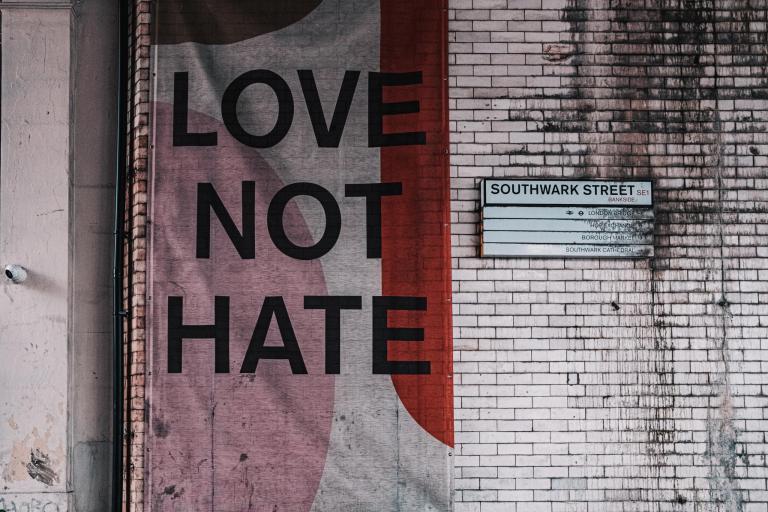From the time we are children, we are taught that hate is bad. No matter what is said or done, we are reprimanded when we respond in hate.
That is, generally speaking.
A few years ago, our pastor told a story about how his daughter’s class (I think she was in second grade) had a discussion about newly elected President Trump. The teacher had emailed the parents to share some of what was discussed. One of the quotes shared was, “I hate Donald Trump”, which the teacher followed with a comment about her pride in how thoughtful, honest, and caring the students were.
So, hating Trump is a good thing?
When we teach our children not to hate, in a general sense, what we are really teaching them is not to hate the wrong things. Whether we use explicit language or not, we have all been conditioned to view hate as acceptable when aimed properly.
So, when is hate okay? Is it okay to hate Trump? Biden? Is it okay to hate the Red Sox or my noisy neighbor or the IRS?
Only the worst among us think it is okay to hate groups of people according to their race, gender, or sexual preference. And those people are clearly delusional about when hate is okay. But what about hating wealthy people? Or hating men? What about hating the government or hating church? Because of historical perspective, practical implications, and a host of other reasons, these latter questions are very different from the former one. That distinction needs to be acknowledged. That being said, when exactly is it okay to hate?
Hate What is Evil
When I point out that we were all taught to hate properly rather than to not hate at all, I am not just poking fun at the inconsistency of our messaging.
In fact, hating the right thing is Biblical! You can read that sentence again if you need to.

The Bible says, “hate what is evil” (Romans 12:9). It also says, “there is a time to love and a time to hate” (Ecclesiastes 3:8).
So, how do we do this? It seems such a slippery slope, which is why Christians tend to ignore it (even while their behavior reinforces a perverted application of the truth).
The key is found in another verse. Ephesians 12 says our struggle is not against flesh and blood (persons) but against the spiritual forces of darkness.
So, it is never proper to hate a person. What we ought to hate is arrogance, violence, bigotry, perversion, deceit, and the like. These perversions are the proper target of our hate.
The Perverse
So, we can hate the evil forces behind human activities, but we should not hate the human.

It is easy to see how this is a dangerous slope. We hate the evil thing one person did to us. Then someone who looks like, sounds like, or lives near the person who harmed us does something similar. Now, we start to associate geography, gender, sexual orientation, tax bracket, or whatever else with the evil force. Before we notice, we have generalized an entire faction of humanity.
Which, to be clear, some factions have done a lot to reinforce our ire.
But here is the thing. Hate is not about them. It is about you. When we choose to hate something, it is not the indictment on persons we think it is. It is not a punishment of others. It is revelatory of our own character.
Hate is essentially this: a commitment to close yourself off from something.
When we generalize, we close ourselves off from a vast amount of people who may have something valuable to add to our lives and the communities in which we participate. When we commit to throwing them away, we lose any of their potential value. Which, hard as this might be to believe, harms us all.
And the other danger is this: when we try to personify things like lust, greed, and deceit in another person (or groups of persons), we create a blindspot. We make it an us versus them thing. And if they are bad, then, hey, I must be good. And this protects us from having to hate the evil inside us. And, like it or not, we all have the sparks of evil inside us. We fan them when we ignore them. To our own peril. If I hate the arrogance of another but do not have the courage to address the arrogance inside of me, I am not only a hypocrite, I am lost – and life will be a series of infuriating experiences after another because I am focused on a “solution” that does not work while subconsciously feeding the deep problem within me. If I hate the bias of others without acknowledging the bias within me, I am on shaky ground. If I hate the ways I have been hurt without questioning the ways I have hurt others, I am (at best) addressing only half of the pain.
We have every right to be hurt and angry (hate and anger are two very different things). We have a moral obligation to fight for external change. But we also have a spiritual obligation to address internal change.
So, when is it okay to hate? It is okay to hate the source of evil. Not the person or persons through which it manifests itself. Not the categories or subcategories of humanity in which we clearly see evil at work. Not ourselves (even when we give in to the temptation of evil, our identity is not inherently so). One of the great tricks of evil is showing us where it is present in others while shading us from its presence in ourselves.
The irony here is that hating properly allows us to better fight against it. It allows us to see one another as co-laborers against the powers of evil, to redeem ourselves and others to the cause of good.












